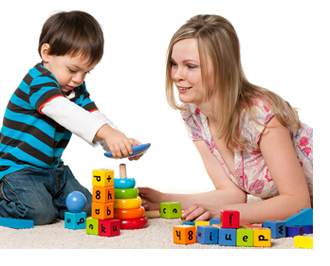
Study Finds That Single Mothers Can Reduce Stress by Playing, Engaging with Children
MANHATTAN, KS; June 19, 2012— A group of three Kansas State University researchers is studying ways to help single mothers improve their relationship with their children.
Among many of their findings, they have discovered that single mothers who engage with children in daily activities—such as reading stories or playing games—may experience lower levels of stress.
The researchers—Blake Berryhill, Tulsa, OK.; Kristy Soloski, Parma, OH; and Rebekah Adams, Ripon, CA—are all doctoral students in marriage and family therapy and work with the K-State Family Center.
About 41 percent of births in the United States are to unwed mothers, Berryhill said, and it has been shown that single mothers often have higher levels of parental stress than married mothers. Parental stress involves the difficulty that a mother can experience from the demands of being a parent.
"Single mothers can feel constantly overloaded and overwhelmed at being a parent and trying to fulfill all of their responsibilities," Berryhill said. "Being a single mother brings extra stress, because they have decreased economic resources, longer work hours and their social support network may be limited as well. Because of all of this, they can feel the constant stress of 'how am I doing in my role as a mother?'"
The researchers wanted to develop ways to help single mothers by better understanding the relationship between parental stress, parental engagement and child temperament. Parental engagement involves spending time with a child through daily activities, such as reading stories, playing games or putting their child to bed. Child temperament involves a mother's perception of the child, such as viewing the child as someone who cries a lot, is fussy or gets upset easily.
The researchers used a national set of data related to single mothers and studied parental stress, parental engagement and child temperament when the children were ages 1, 3 and 5.
By studying this data set, the researchers discovered several important findings:
- Single mothers who reported high levels of parental stress when their child was 1 were more likely to continue to have high levels of parental stress when their child was 5.
- Single mothers who spent time engaging in daily activities with their child at age 1 were more likely to continue to stay engaged with their child at age 5.
- Child temperament at age 1 can predict levels of parental engagement when a child is 1 and 5 years old. The more difficult a child is at an early age, the less likely the mother is to engage with them.
- Child temperament at age 1 can predict the level of parental stress when the child is 1. If a child is seen as difficult and fussy, it increases the level of parental stress.
- The level of parental stress does not predict the level of parental engagement. This means that even if a single mother is stressed or overwhelmed in her role as a parent, it does not predict how much time she will spend with her child.
- A higher level of parental engagement can reduce the level of parental stress. This means that the more time a mother spends engaging with her child in daily activities, the lower level of stress she may experience and the more energizing she may feel as a parent.
"The last finding was especially interesting to us because it helped us realize that the answer is spending time with their children," Berryhill said. "Being a single mother and being a parent in general is very exhausting, but if a mother is willing to spend time with her children, it can reduce her parental stress because she will feel that in her role as a mom, she is doing an adequate job."
For the three clinicians, the discovery that engagement can reduce stress was an unexpected, yet positive finding.
"If we can help moms spend more time with their child and help them in that way, then their levels of parental stress will be reduced and they will have more fulfillment in their role as a mother," Soloski said. "Our role becomes helping them find meaningful ways to interact with their children."
"Often, mothers are encouraged to engage with their children for the positive impact it has on the child," Adams said. "The findings show there is long-term positive impact for the mother as well."
The researchers plan follow-up studies focusing on how stress from work affects the parent-child relationship as well as how the relationship changes beyond the age of 5 and into adolescence. Soloski's adviser is Jared Durtschi, assistant professor of family studies and human services. Jared Anderson, assistant professor of family studies and human services, advises Berryhill and Adams.
